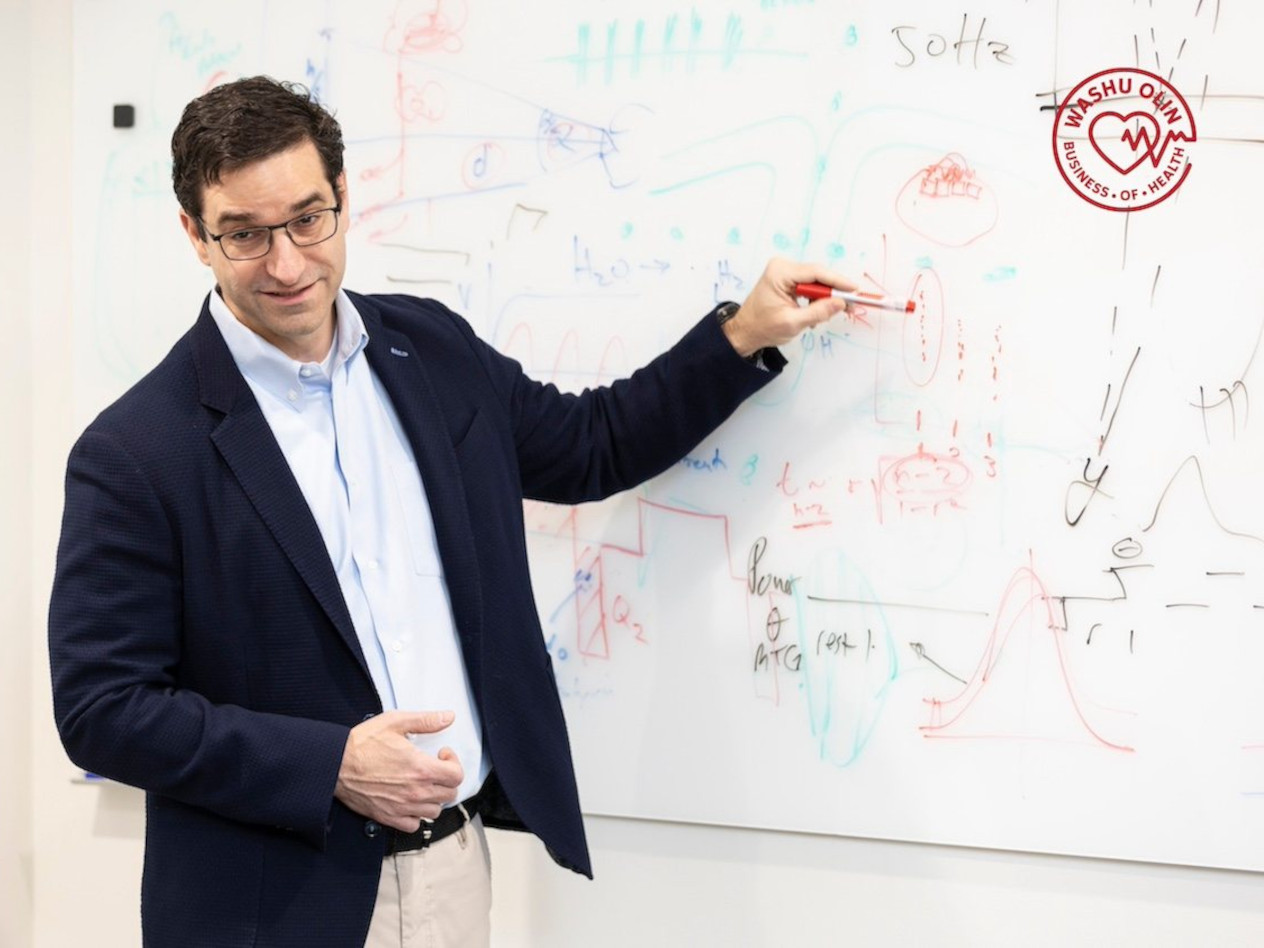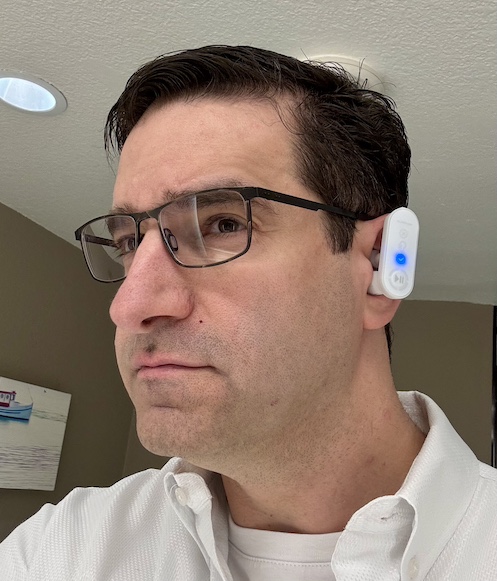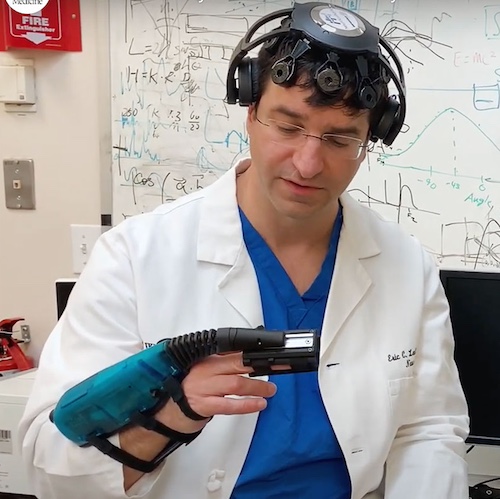Innovating at intersection of brain science, business, and community
- May 14, 2025
- By Jill Young Miller
- 5 minute read

When Eric Leuthardt was in elementary school, a teacher once sat him down and said bluntly, “You’re not that smart.”
She warned him not to set his sights too high.
At his Catholic grade school in Cincinnati, teachers often confused intelligence with obedience. “And I was ill-behaving,” Leuthardt said with a laugh. But he didn’t take the criticism to heart. “I was going to decide my own fate.”
He charged forward. He once dismantled his Atari console, added some components, and — predictably — blew it up. His chemistry set, back when kits contained powerful chemicals, fueled his curiosity. “You could make acids and flammable things,” he recalled. “I blew up a lot of stuff.”
By high school, his mother had had enough of picking him up after his countless detentions. Looking for a way to channel his energy, she found an after-school internship for him at a neurosurgery lab at the University of Cincinnati.
“I don’t even really know how that happened,” Leuthardt said. But the experience — working with Dr. Keith Crutcher during high school — changed everything.
“That guy transformed my life,” Leuthardt said. “I'm a high school student, and he would sit down and talk to me for so long — about science, theology, philosophy. He inspired me.”
In the lab, he operated on chicken embryos and explored the nervous system, sparking an enduring passion for the intersection of mind, brain, and technology. (The research even led to his first published academic paper.) He also got to observe surgeries firsthand.
Through Crutcher’s mentorship, Leuthardt learned a lesson that has guided him ever since: “If you can see the potential in people, they will go beyond their own expectations.”
Inspired by conversations with Crutcher, he studied biology and theology at Saint Louis University. Then he earned his medical degree from the University of Pennsylvania.
Neurosurgeon, entrepreneur, EMBA alum
Today, Dr. Eric C. Leuthardt, 51, is a renowned neurosurgeon at Washington University School of Medicine, a pioneer in neurotechnology, and a successful entrepreneur who holds hundreds of patents.
He’s also an Olin Business School graduate, having earned his Executive MBA in 2024 to gain the business acumen he wanted to run his own neurotechnology companies.
Leuthardt’s story is one of resilience, imagination, and relentless pursuit of impact — not just through surgeries and patents, but through leadership, mentorship, and community transformation.
At first, classmates like Ryan Kight, EMBA 2024, weren’t sure what to make of him. “Eric's bio was very lengthy, and everyone else’s was a short paragraph,” Kight recalled. “And so, we thought, who is this person?”
But it didn’t take long to see beyond the impressive résumé. “Eric is a very thoughtful person,” Kight said. “He’s focused but knows how to have fun. He always encouraged deeper, broader thinking.”
Leuthardt didn’t approach the program with a know-it-all attitude. “He came to discover what he could learn from other people,” Kight said.

And it paid off: “Olin gave me the skills and the wherewithal and the confidence to lead, to be the CEO of my first company,” Leuthardt said. Today, he’s the CEO of Aurenar, a company developing the world’s first single-use, wearable vagal nerve stimulation device for ICU patients. (Kight now serves as the company’s CFO.)
The device, mounted on patients like a Bluetooth earpiece, aims to reduce inflammation and serious complications in critical care patients — a revolutionary advance that could shorten ICU stays and save lives.
Innovation at every level
Leuthardt’s accomplishments are staggering:
- 200+ peer-reviewed publications
- 600+ patents (and another 1,000 pending)
- Nine start-ups founded
- Two technologies with FDA Breakthrough Device designation, which expedites the development of devices to treat life-threatening or debilitating conditions
At WashU, his titles are numerous: Chief of the Division of Neurotechnology, director of the Center for Innovation in Neuroscience and Technology, director of the Brain Laser Center, and Shi Hui Huang Professor of Neurosurgery.
This year, he was named WashU’s assistant vice chancellor for innovation and commercialization. Leuthardt is an avid supporter of Olin and cross-campus collaboration. He was a panelist, along with Chancellor Andrew D. Martin, at Olin’s first Business of Health Symposium in April. Olin’s health initiative “is going to supercharge our ability to have impact, both for people’s lives and regional economic development,” Leuthardt said at the event
He’s also deeply committed to building a thriving neuroscience ecosystem in St. Louis.
As the principal investigator for the National Science Foundation’s NEURO360 grant, he’s bringing together partners from across academia, industry, and underserved communities to make neuroscience innovation more equitable and impactful.
As if all of that’s not enough, the father of two channels his medical expertise into creative endeavors to help the world see the possibilities of neuroscience.
He’s an Emmy Award-winning playwright for “Brain Works – Your Mind on Life” and was a writer and actor in the PBS series “Brain Works – The Theatre of Neuroscience,” dramatizing real-life neurological cases.
He’s also the author of two science-fiction thrillers, “Red Devil 4” and “Limbo.”
Thought-controlled technology
One of Leuthardt’s proudest achievements is the IpsiHand System, a noninvasive device that helps stroke survivors regain hand and arm movement using brain-computer interface technology.
In a nutshell, here's how it works: If a patient imagines moving their hand, it translates those signals in real-time into the movement of a robotic handpiece worn on the affected hand, essentially allowing the patient to "think" their hand into motion.
This is achieved through a electroencephalogram (EEG) headset that picks up brain activity and sends the signal to a handpiece that mimics the intended hand movement.

Patients wear an EEG headset that reads signals from the healthy side of the brain. If a patient imagines moving their paralyzed hand, the headset picks up the signal and activates a robotic handpiece — literally translating thought into movement.
The conventional wisdom about stroke patients was that if they hadn't regained movement in their affected limb within six months, they never would. That's no longer the case — not by a long shot.
The IpsiHand is already transforming lives. Rick, a former paramedic who lost use of his right arm after a stroke, was one of the first clinical trial participants. After four years of paralysis, he regained enough movement to do something small but deeply meaningful:
”Doctor Leuthardt!” he called out one day. ”I can put my pants on again!”
The neurons in the healthy side of Rick’s brain had rewired to control his injured hand — a life-changing moment for both patient and doctor.
”More than any paper, patent, or award, that was the most important moment of my career,” Leuthardt said. ”I gave a man his dignity back.”
Media inquiries
For assistance with media inquiries and to find faculty experts, please contact Washington University Marketing & Communications.
Monday–Friday, 8:30 to 5 p.m.
Sara Savat
Senior News Director, Business and Social Sciences
